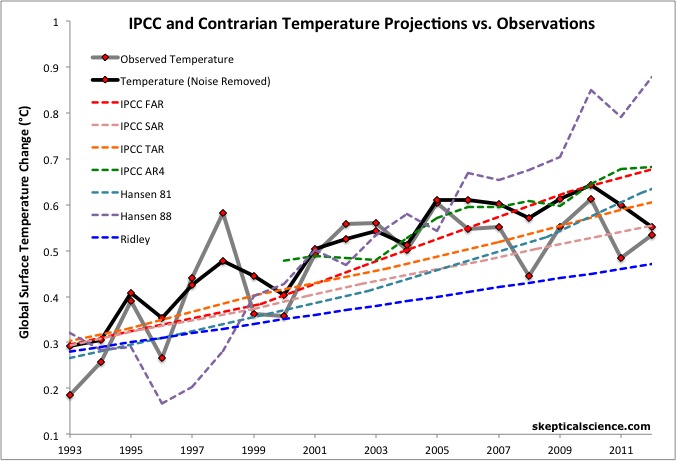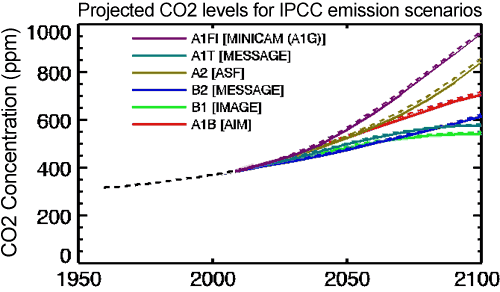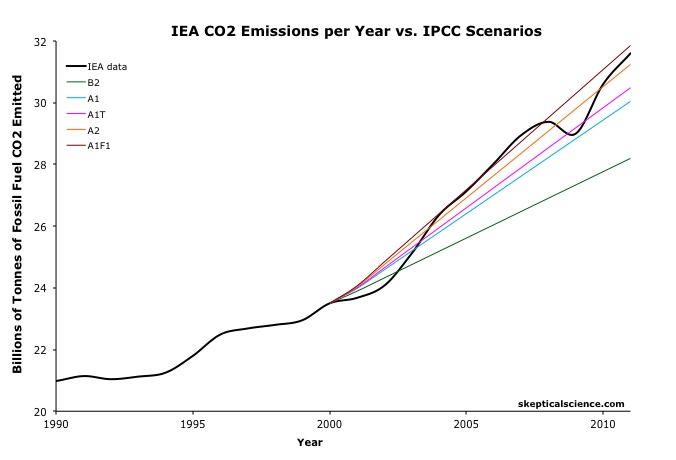Lessons From Past Predictions: Ridley vs. IPCC and Hansen
Posted on 24 January 2013 by dana1981
On his Deltoid blog, Tim Lambert recently dusted off an old global warming prediction made by Matt Ridley in 1993.
"Global warming, too, has shot its bolt, now that the scientific consensus has settled down on about a degree of temperature increase over a century - that is, little more than has taken place in the past century."
Note that Ridley's characterization of the scientific consensus on global warming in 1993 was not remotely accurate. The Intergovernmental Panel on Climate Change, which represents the consensus position of climate scientists, issued a Supplementary Report in 1992 stating,
"The range of values for climate sensitivity reported in 1990 Assessment, and reaffirmed in this Supplement, was 1.5 to 4.5°C, with a best estimate ... of 2.5°C"
In his response to Lambert's post, Ridley provided the full text of his 1993 article. Reading the article may produce another Ridley déjà vu moment, because the content is very similar to Ridley's 2012 article in WIRED magazine, basically claiming that all environmental concerns, including global warming, are nothing more than alarmist hype. Apparently Ridley's thinking has not evolved over the past two decades.
Lambert's analysis of Ridley's 1°C warming prediction was unfair in its graphical depiction, placing its starting point in line with the temperature in 1993, which was a low point due to the cooling influence of the Mount Pinatubo volcanic eruption. Figure 1 below is a fairer depiction of his prediction. Whether Lambert's critique of Ridley was fair, mentioning "how wrong his prediction was so far", is another question which we will examine in this post.
The devil is in the details - does Ridley's prediction assume a linear or accelerating warming trend over the next century, for example? He does not specify, though in his response to Lambert, Ridley treats his prediction as a linear one.
IPCC and Hansen vs. Ridley
However, Ridley also proceeded to shoot himself in the foot by claiming that unlike his prediction, those made by the IPCC and James Hansen "HAVE failed". In reality, even allowing Ridley the most generous assumption of a predicted linear warming trend, most of the warming projections by both the IPCC and Hansen have been far more accurate than his own (Figure 1, Table 1).
Figure 1: Average global surface temperature (average of GISS, NCDC, and HadCRUT4; gray and red), same data with solar, volcanic and El Niño Southern Oscillation influences statistically removed by the Foster and Rahmstorf (2011) methodology (black and red), and various temperature predictions (dashed). Each prediction has been baselined using the 5-year running average at 1990, 1993, or 2000, as applicable to each prediction.
Table 1: Predicted global surface warming trend for 1990, 1993, or 2000 through 2012, accounting for actual greenhouse gas emissions, and the difference from the underlying observed trend of approximately 0.16°C/decade
| Predictor | Predicted Trend (°C/decade) | Difference from Underlying Observed Trend |
| IPCC FAR | 0.20 | 25% |
| IPCC SAR | 0.14 | -12% |
| IPCC TAR | 0.16 | 0% |
| IPCC AR4 | 0.18 | 12% |
| Hansen '81 | 0.15 | -6% |
| Hansen '88 | 0.28 | 75% |
| Ridley | 0.10 | -38% |
The analyses here of warming predictions made by the IPCC and Hansen take the actual observed greenhouse gas emissions over the past two decades into account. For details about how this was done, click the links in the first column of Table 1.
The third column of Table 1 compares the predictions to the underlying observed global surface warming trend of 0.16–0.17°C per decade over the timeframe in question, when removing the short-term influences of the unpredictable effects of volcanic eruptions, solar activity, and the El Niño Southern Oscillation (using methods described by Kevin C and Foster and Rahmstorf 2011).
As this column shows, all of the predictions Ridley claims "HAVE failed" were more accurate than his own, with the exception of Hansen (1988). However, the equilibrium climate sensitivity in Hansen's 1988 model was 4.2°C global surface warming in response to a doubling of atmospheric CO2. Hansen and his climate scientist colleagues now agree that equilibrium climate sensitivity is closer to 3°C for doubled CO2, similar to the sensitivity of the climate models used in Hansen (1981) and the IPCC TAR and AR4, which also had amongst the most accurate predictions. Ridley on the contrary is sticking behind his rather inaccurate prediction.
Linear Assumption is Overly Generous to Ridley
Additionally, as noted above, we were very generous to allow Ridley a linear 0.1°C per decade prediction. In reality, under all but the most aggressive realistic greenhouse gas emissions scenarios, CO2 concentations will continue to increase at an accelerating rate throughout most of the 21st century (Figure 2).
Figure 2: Atmospheric CO2 concentrations as observed at Mauna Loa from 1958 to 2008 (black dashed line) and projected under six IPCC emission scenarios (solid coloured lines). (IPCC Data Distribution Centre)
But of course by constantly writing articles claiming that global warming is nothing to worry about, Ridley is helping to fuel efforts to ensure that we continue with business-as-usual emissions, which are currently on track with Scenario A2 (yellow in Figures 2 and 3).
Figure 3: IEA fossil fuel CO2 emissions estimates vs. IPCC SRES emissions scenarios.
If Ridley is correct that climate sensitivity is relatively low (he believes it's around half the consensus most likely value, at 1.5°C warming for doubled CO2), then an atmospheric CO2 concentration of 750 ppm in 2100 would commit us to about 2.1°C of eventual warming over pre-industrial temperatures, and approximately 1°C of that surface warming would occur over the century in question.
However, to reach 750 ppm by 2100, CO2 emissions and global warming would have to accelerate over the 21st century, and in that case we would only expect to see about 0.14°C warming total between 1993 and 2012 (0.07°C per decade). So if we are less generous to Ridley and account for a realistic emissions scenario, his prediction of 1°C warming over the next century only includes 0.07°C per decade for 1993–2012, which is too low by 56%.
Lesson From These Predictions: Don't Mess with IPCC
As we have now shown several times, the IPCC surface temperature projections have been exceptionally accurate (although they have under-predicted many other climate variables, such as Arctic sea ice extent decline and sea level rise). Ridley would have been wise to simply argue that a linear 0.1°C warming prediction is not terribly wrong yet, rather than trying to incorrectly claim that his prediction has proven more accurate than those made by the IPCC and James Hansen. In reality, his is not even close to the accuracy of the IPCC.
Ridley's prediction has fared better than Hansen's 1988 model (but much worse than Hansen's 1981 model); however, Hansen no longer believes his 1988 model was accurate, whereas Ridley continues to stand behind his lowball 1993 prediction. Failing to learn from his past mistakes is a common thread in Ridley's writings, as he still wrongly attacks all environmental concerns as "alarmism", and still fails to account for any but the best case scenario, which helped cause his bank to fail and require a government bailout. As noted above, his thought process never seems to evolve beyond its original misconceptions.
Ridley claims those made by the IPCC and James Hansen "HAVE failed", but all the IPCC predictions have been much more accurate that Ridley's. The only one that has performed worse was Hansen's 1988 model because of a too-high climate model sensitivity, something that Hansen acknowledges and corrected in later versions of his model. This is a tacit admission by Ridley that his prediction has failed, so perhaps Lambert was not too harsh in his judgment of Ridley after all. A 50+% error is certainly not a performance worth bragging about.































 Arguments
Arguments


































#18/19 JasonB and DougH:
You may be interested to read one or all of the following:
My post about the GWPF's Academic Advisory Council: http://lackofenvironment.wordpress.com/2012/08/13/sampson-and-the-temple-of-economic-dinosaurs/
My posts about the Bishop of Chester (on its Board of Trustees): http://lackofenvironment.wordpress.com/2012/10/18/fostering-denial-in-the-church-of-england/
Worryingly, Ridley is also on the advisory council of Sense About Science (http://www.senseaboutscience.org/pages/advisory-council.html), along with at least one other climate denier (Tony Trewavas). Might explain why SAS has been seems to have been very quiet about climate disinformation.